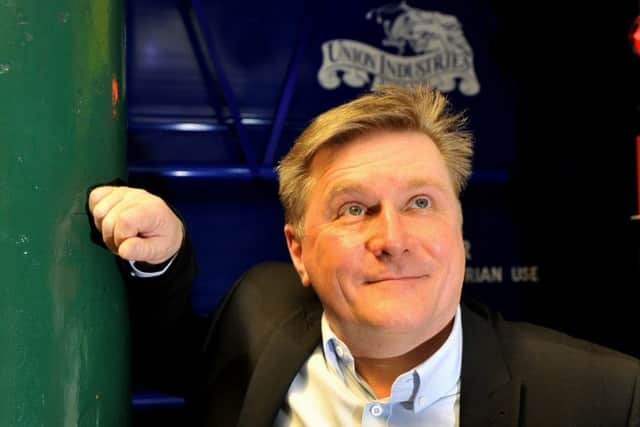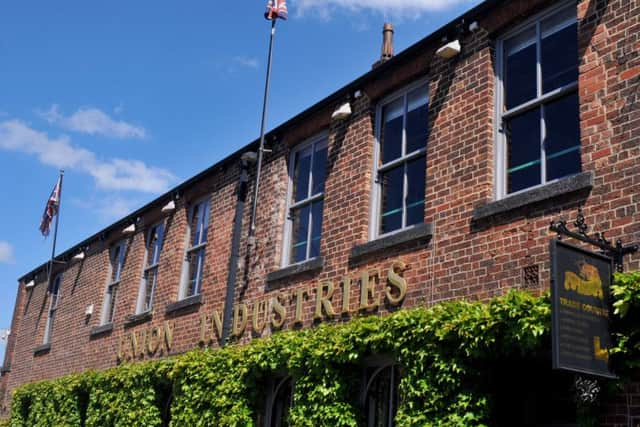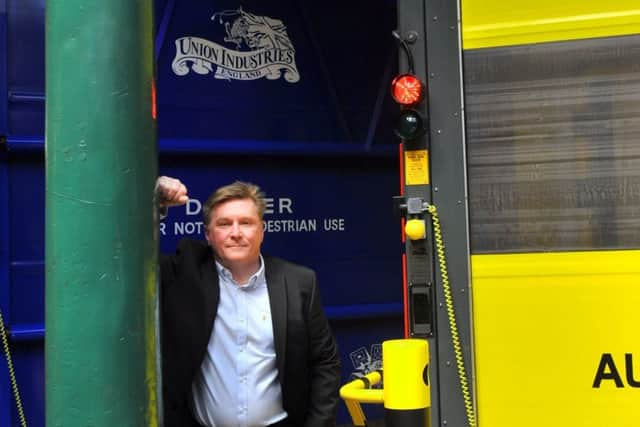Andrew Lane: The managing director of Union Industries with no qualms about the workforce deciding his fate
It’s not often ageing business owners decide to sell their company at a lower than market rate with payment structured over 14 years. However, that’s exactly what Paul and Isobel Schofield did with Union Industries back in 2014.
Instead of a trade sale, which would have fetched a lot more money and in a lump sum, the couple sold the Leeds-based industrial door manufacturer to its employees.
Advertisement
Hide AdAdvertisement
Hide AdTo help usher in this new era for the business, which employs 85 staff, they appointed Andrew Lane as managing director.
Mr Lane has nothing but praise for the former owners. In addition to entrusting the overall leadership of the business to him, Mr and Mrs Schofield also left £1m in the bank to ensure the company had enough cash reserves as it transitioned to being employee-owned.
A survival ensuring deal
“That deal was designed to make this business survive. It wasn’t about them. It was about making the company sustainable and for it to have a bright future,” Mr Lane says.
Ever since entering employee ownership, Union Industries has enjoyed record profits. This year the company gave every employee a £3,500 tax-free bonus.


Advertisement
Hide AdAdvertisement
Hide AdMr Lane, as managing director, is also accountable to the staff at Union Industries.
Facing re-election
Every three years he has to face re-election, as do his two other directors when their three-year terms expire.
“Once every three years I stand in front of the people and say ‘right I’m resigning’,” he says. “I walk out of the courtyard and a vote is held on whether I keep my job.”


The thought of being voted out by staff members might be daunting for some but not for Mr Lane.
Advertisement
Hide AdAdvertisement
Hide Ad“It might appear to be a bit of a pantomime but it’s future-facing, this strategy,” he adds. “I’m used to this. It’s a system that I like because it ensures accountability for me.”
In the event that he is voted out, his position would become untenable and a recruitment process would start.
Union Industries has a trust made up of two elected employees, two independent trustees and a chairman. The trust would initiate the recruitment process for a managing director.


Learning lessons of employee ownership
This isn’t the first employee- owned business that Mr Lane has been a part of. Previously he was operations director at a firm where the model failed.
Advertisement
Hide AdAdvertisement
Hide AdWere Mr and Mrs Schofield not perturbed about appointing someone, from a business where employee ownership hadn’t gone to plan, to lead the transition?
Mr Lane says: “You’d think so, wouldn’t you? The best way to deal with that is face it head on.
“When I wrote my application letter to them I said: ‘I currently work in an employee-owned business. The transition hasn’t gone particularly well, I’ve learned much about the pitfalls of the transition to employee ownership and how to do it right’.”
Despite being one of around 200 applicants, Mr Lane got the job after a rigorous recruitment process that involved sitting in on meetings, going out for dinner with the owners and being interviewed by all departments.


Avoiding the wolves
Advertisement
Hide AdAdvertisement
Hide AdPrior to going down the employee ownership route, Mr and Mrs Schofield did entertain the idea of a trade sale. While initial discussions would start off well, words such as “integration” and “consolidation” would start to creep into conversation.
“What Mr and Mrs Schofield acknowledged is that the company had grown and been successful not by their efforts alone, the people around them had a significant impact on that,” adds Mr Lane. “They didn’t want to cast the employees to the wolves for personal gain.”
A growing trend
Employee ownership is currently growing at more than 10 per cent a year, according to the Employee Ownership Association (EOA). Mr Lane believes that employee ownership can help bridge the growing wealth inequality in society.
“In many companies, the CEO or managing director will take a salary and then they’ll take the biggest share of all the profit distributions that follow that, whether it be a bonus or some kind of share option. The wealthy get wealthier,” he says.
Advertisement
Hide AdAdvertisement
Hide Ad“We don’t allow that here. It’s not right, we get paid well to do our jobs. The distribution of the company being successful is entirely down to all of the parts of the company working in harmony.”
No room for greed
Many companies are missing out by not going down the employee-owned route, according to Mr Lane.
“You go to any management seminar and there will be words like engagement, empowerment, employee integration, stuff like that,” he adds.
“Actually what they mean is they want somebody to take on more responsibility and do more work while the corporate greed culture keeps the maximum amount of money for those at the top.”
Christmas comes early
Advertisement
Hide AdAdvertisement
Hide AdAs managing director, Mr Lane has the biggest salary in the business and therefore he feels it would be unfair for him to be paid a disproportionate bonus.
Seeing staff receive what is to them a life-changing £3,500 bonus also gives him a feeling of accomplishment.
“They can do a lot with that. They can have things that they’ve never had before,” Mr Lane says.
“However people may tell you how big their houses are or how flash their car is, when you see people genuinely surprised, it’s like watching your kids open the best Christmas present ever when they were young.”
No return to old ways
Advertisement
Hide AdAdvertisement
Hide AdMoving into the employee ownership sector initially proved “tremendously difficult” for Mr Lane personally.
“I was part of the system,” he says. “I had gone through various companies improving my position, salary and package each time.”
Ultimately, he wants to ensure that the business, which traces its roots back to 1795, is secure, stable and continues to provide employee satisfaction.
Would he ever return to a more corporate environment when his time at Union does eventually come to an end?
Advertisement
Hide AdAdvertisement
Hide Ad“I couldn’t do it,” Mr Lane says. “I could not work in a conventional structured business again.
“Now that I’ve tasted employee ownership and I’ve seen not only how well it can perform but how fulfilling it can be as a role I’d never go back.”
Curriculum vitae
Title: Managing director of Union Industries
Date of birth: 02/11/1964
Lives: Boroughbridge, North Yorkshire
Favourite holiday destination: The next one – life is an adventure, there are so many places to discover.
Last book read: Jack Reacher
Favourite film: Smokey and the Bandit (inset)
Favourite song: Johnny B Goode
Car driven: Jaguar, it’s British, and a vintage Land Rover, also British.
Advertisement
Hide AdAdvertisement
Hide AdMost proud of: Two strong, intelligent and independent daughters
Education: Leeds Polytechnic – Engineering, Coventry University - Business.